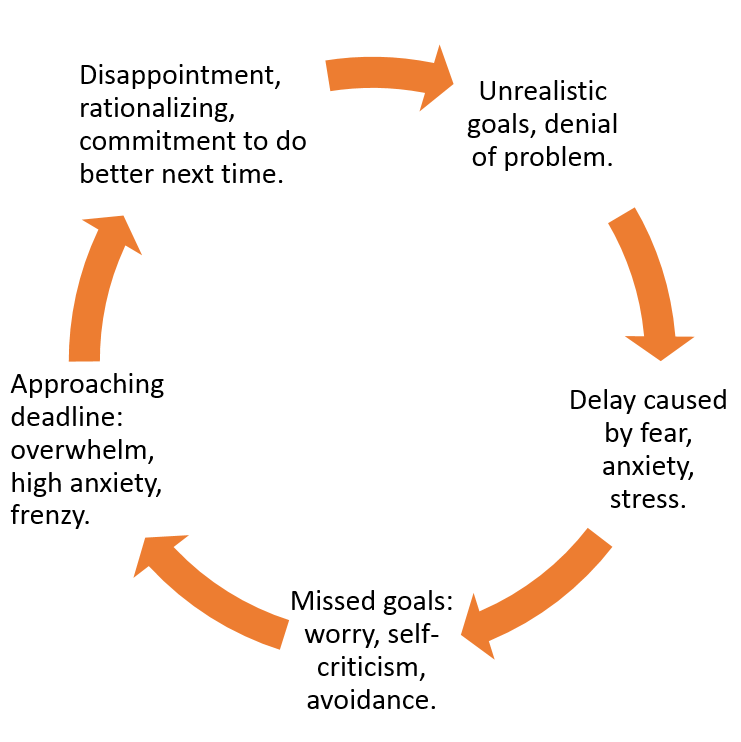Published In
Anxiety

How to Recognize and Overcome Anxiety-Induced Procrastination?
Do you know that anxiety and procrastination are related to each other? Psychology says that when we feel anxious, we put the work on hold. Or when we’re piled up with a lot of work, we feel anxious, then we put the work on hold, and start procrastinating. We all have been in a similar situation, right? Well, this situation is called anxiety-induced procrastination.
During the episode of anxiety-induced procrastination, even a simple task looks like climbing a mountain. In this blog, let us find out what anxiety procrastination cycle, its examples, symptoms, overcoming tips, and more. So, let’s get started!
What is Anxiety-Induced Procrastination?
Like other types of procrastination, anxiety-induced procrastination is not only about delaying tasks but it’s a misbalance between an anxious state and avoiding important tasks that need to be done. The fear of not completing tasks before time or perfectly activates the cycle of avoidance which makes even simple tasks complex and harder to achieve.
The fact is that anxiety-induced procrastination can also be a form of trauma response in some cases. According to psychologists, it can be a way our minds deal with negative or traumatic feelings. It can also be a type of defense mechanism that allows a person to live in a temporary escape from the trauma or negative situation experienced in the past.
But more importantly, procrastination can never be a coping skill, the reason why? Because it does not solve any issue or provide relief from stress. It activates the avoidance cycle which can induce stress and anxiety more. now, that you might have understood the actual psychology behind anxiety-induced procrastination, let’s move on to the next part!


Signs of Anxiety-Induced Procrastination
1. You’re constantly blaming others for your avoidance.
Anxiety, procrastination, and perfectionism can manifest in several ways. Talking specifically about anxiety, it may look like hopelessness or anger and eventually, you may find yourself blaming others, your loved ones, or colleagues for the activation of your avoidance cycle.
In such cases, acknowledging your anxiety can be useful. There might be other factors as well that might be contributing to your inaction however, focusing more on self-responsibility can help you detangle the loop of anxiety and stress associated with procrastination.
2. You’re experiencing anxiety at an extreme level.
Sometimes, we delve into the task so much that completing simple tasks feels like climbing mountains. We touch an extreme level of anxiety when the deadline is near and we’ve not focused on the important part. As a result, we start re-evaluating our work which takes more time and triggers anxiety more. Does this happen to you all the time? Then, you might be a chronic procrastinator.
In such cases, it’s important to understand what needs to be done first. It’s time you give yourself a reality check and perform basic skills and evaluation before starting a task.
3. You’re not able to achieve progress.
When you deal with negative thoughts, anxiety, and avoidance, you start feeling nervous about completing a task. Eventually, you start doubting your own capabilities, skills, and strengths.
For example, suppose you’re at work, you’re a pro at Excel, something went wrong while putting the formulas, and now you don’t want to proceed further, because you’re scared that the whole data will be incorrect if you do it that way. In such cases, people often label themselves as anxious even when they’ve completed the tasks before several times. They need to feel capable and empowered in order to begin the progress again.
4. You’re filled with resentment and overwhelming feelings.
In some severe cases, anxiety gets combined with other emotions. Generally, it takes the look of anger, resentment, and overwhelming feelings. As I mentioned above, people experiencing anxiety-induced procrastination start blaming others for their inaction. This statement perfectly fits the resentment criteria as well.
For example, suppose you want to complete a task and now you’re feeling resentful because all the work you might have done in the past is looking like a waste of time and now you don’t have that extra time for doing logical calculations, you will eventually feel angry and anxious at the same time.
5. You’re in dire need of doing everything perfectly.
As I mentioned above perfectionism, anxiety, and procrastination go all together. Sometimes, we want to do everything perfectly so we end up focusing on the not-so-important tasks instead of focusing on the important tasks such as figures or values.
This situation commonly triggers anxiety-induced procrastination as most people avoid performing the basic calculations before evaluating the task in the beginning. The dire need to do everything perfectly vanishes the progress of the task which eventually results in negative thoughts, anger, resentment, and other overwhelming feelings.
6. You’re dealing with an unknown fear or low self-esteem issues.
During this procrastination-related chaos, there’s an underlying mental health issue that we commonly ignore. Fear of the unknown or low self-esteem issues can be triggered by negative beliefs, anger, and overpowering fears.
According to psychology, people struggling with anxiety disorders or procrastination are prone to experiencing low self-esteem issues and phobias. The fear or self-doubt connected with procrastination can hinder your progress.
Strategies to Overcome Anxiety-Induced Procrastination
Do you want to resolve anxiety-induced procrastination, well fear not, because with the help of the right strategies and coping techniques, you can break the cycle of avoidance and procrastination effectively and reach your goals. Follow the below-listed strategies to overcome anxiety that came along with procrastination.
1. Break down your tasks into short-term tasks.
Sometimes, we dwell on long-term tasks that are unachievable in a short span of period. Well, if you want to succeed, one of the effective ways is to break down your long-term tasks into short-term tasks. This way, you will be achieving something every day and will be able to complete your task before the deadline.
If you will abide by this technique regularly, you will get extra time for re-evaluation and correcting your mistakes as well. Dividing your tasks into small tasks helps you increase your productivity level and also helps in maintaining motivation levels. Additionally, this approach makes all short-term tasks less intimidating and helps you attain progress.
2. Set realistic and achievable goals.
Chronic procrastinators are not good at setting realistic goals which is why they often set unachievable goals for themselves. In order to overcome anxiety-induced procrastination, it’s time to understand the basic skills before taking over a task. While you start planning, it’s important to evaluate the task realistically and set goals that are achievable in a given timeline.
The urge to do everything perfectly often leads to a pile-up of work which eventually results in anxiety, anger, procrastination, and a cycle of avoidance. Before taking over a task, plan wisely, divide your tasks, and achieve small tasks regularly so that you can reach your goals within the timeline.
3. Take the help of time management tools or apps.
One of the best and most effective ways to reach your goals before time is to take the help of time management tools or apps. Herein, you can also prepare a to-do list every day, this will help you prioritize important tasks.
Time management tools like scheduler, Pareto analysis, pomodoro technique, or using calendars regularly will ease up your work, and maintain motivation and productivity levels. Time management is really important for combating procrastination. Additionally, they will help you prevent burnout and maintain your energy levels throughout the day.
4. Challenge negative thinking and stay mindful.
As I mentioned above, procrastination, perfectionism, and anxiety go all together which means negative thinking also sums up to an extreme level. In order to avoid negative thinking, you can actively challenge your negative thoughts by achieving short tasks regularly.
Herein, you can also take the help of affirmations or realistic goals to overcome negative thinking. Additionally, mindfulness can be the ultimate tool to reach your goals, reduce anxiety and stress, and improve your overall well-being.
5. Practice relaxation techniques
Relaxation techniques are so important for staying mindful, energetic, and motivated throughout the day. Additionally, they take care of the common mental health issues induced by procrastination such as stress, anxiety, negative thinking, and depression. relaxation techniques quickly clear your mind, improve focus, and welcome positive energies.
6. Seek support from your mentors or supporters
Throughout the planning and working, whenever you feel overwhelmed you can seek support from your mentors or the people who support you. This way, you will be able to learn effective learning techniques, retain your motivation levels, and reach your goals within the timeline.
7. Embrace positivity and reward yourself
Throughout the progress journey whenever you achieve something, reward yourself or appreciate yourself. This practice embraces positivity and reinforces a sense of achievement. This strategy can be very useful for combating anxiety-induced procrastination.
8. Seek Professional help
When procrastination, anxiety, anger, resentment, and negative thinking loops become excessive or uncontrollable, it’s important to seek professional help.
A mental health professional will offer extended support and strategies that will help you reach your goals and improve your overall mental well-being.
I hope this blog helps you recognize and overcome anxiety-induced procrastination. For more such content, connect with us through all social media platforms.
Comment down and share your views on the same or you can also write to us at Calm Sage.
Thanks for reading!
